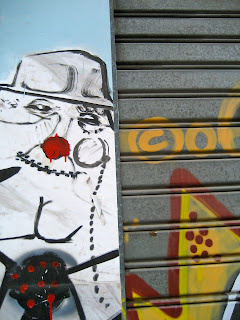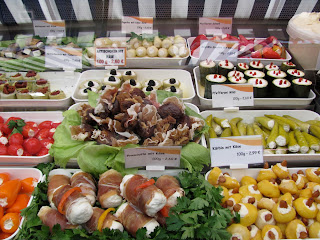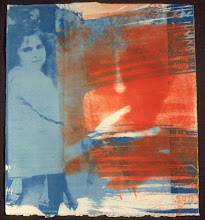Friday, September 24, 2010
Tuesday, September 21, 2010
Sunday, September 19, 2010
Saturday, September 18, 2010
Friday, September 17, 2010
Thursday, September 16, 2010
Sunday, September 12, 2010
Saturday, September 11, 2010
Friday, September 3, 2010
4 seasons
In our home we celebrated each month of the year using its distinctive flower, fruit, dessert and dish. My mom always had fresh flowers in a vase on the big dining room table. Sweet smelling paper whites for my name day on January 18. Flowering brunches of almond tree and tulips in February, the first anemones and yellow mimosas in March, lilacs in April, ranunculus in May, lilies and roses in June, in July and part of August we were always away for the summer so we were not buying flowers. There were roses again in September, mums in October, pyracanthai in November and holly, evergreens and mistletoe in December. The mistletoe never lasted for long since I couldn’t resist crushing its soft white pearls and of course getting scolded for it. In time I had developed a strategy: crush a couple white pearls and wait until the first of the year to finish them all.
The food also varied according to the seasons. We ate milk fed lamb on Easter Sunday, and baby lamb chops only to early June. Lamb in the summer was considered “heavy” food, plus the lambs that were born in spring were no longer milk fed and tender. We ate game in the fall, pork during the cold months, fresh fish mostly from spring to fall and salt dried cod in the winter. Chicken and beef were cooked in various ways all year round. Also the fruits and vegetables followed the seasonal change. And every time we tasted the first fruit of a season we said: “ade keh to hronu”, an expression that means “may we be blessed to taste it again next year”. My favorite season was from May to September. May and June meant cherries and strawberries that my dad taught me to eat dipping them in sugar. The cherries I had to open in half and check for warms before I ate them. The same method applied to the aromatic and beautiful apricots. At the time there were not effective pesticides so we had to carefully inspect every fruit and vegetable before eating them. Mulberries offered instant gratification since for some peculiar reason they were free of warms, although they are the main food for the silk worms. My great aunt Efterpi had mulberry trees in her yard and when they were ready sometime in early June she would bring us two very small baskets filled one with white and the other with black mulberries. I could never make up my mind which ones I liked the best , so I would eat one of each trying to decide until I would finish them all.
July brought watermelons and also peaches with fuzzy skins that sometimes made me itch, but I ate them any way since they were juicy, sweet and aromatic. On hot summer nights instead of dinner we ate slices of watermelon together with feta cheese. A terrific combination of sweet and juicy with salty and dry or creamy cheese. Another variation to this light meal is feta and ripe melon. Absolutely delicious!
Tomatoes were also a late July fruit and sometimes I liked eating them, but most of the times I would hate them. Once my mom was trying to make me eat a tomato and I was stubbornly refusing to the point that she lost her temper and pressed the ripe fruit on to my face. Oh, well, childhood was not a bed of roses. And if it was so, even roses have thorns.
The reason I did not always like tomatoes is because their taste and texture was never predictable. The fruit vendors had total control of their merchandise, meaning that the buyer could not choose, so very often in a two pound bag of tomatoes they would put a couple of good ones on the top while the rest was either unripe or over ripe ones, good only for sauces. Very early in my life my parents started taking me along to the market place were they would teach me the secrets of choosing fresh and good quality ingredients for cooking. For example lemons and oranges should have their spot they were hanging from the tree green and fresh while their skin should be firm and thin. Meat should be freshly slaughtered and pink, fish should have pleasant smell, red gills and with sparkling, not cloudy eyes. The cheese should be tasted before purchase while coffee and exotic spices should be bought in small quantities so that they do not loose their aroma. The only fruit I do not know how to choose are the melons. They seem to be deceiving and mysterious and very often I make the wrong choice.
Winter was seemingly a boring season in every way. There were three kinds of fruit, apples that I did not like, oranges that were often too tart and bananas that were about three inches long but at least predictably sweet. As for vegetables there were potatoes, too starchy, cabbage, too smelly, leeks, the epitome of disgustingly slimy and stinky vegetable, carrots were ok though not exciting, celery root was good since it gave a distinctive flavor and aroma to the bean soup, and quince that though it is a fruit it is versatile enough to be cooked with pork in a sweet and sour combination. For a brief time around November chestnuts would make their appearance first at the street corners roasted on a makeshift coal stove and soon after on our potbelly wood stove. Chestnuts in the winter were the equivalent of ice cream in the summer. Since refrigerators were kind of rear, ice cream was sold and consumed only in the summer. I had a love and hate relation with it. I liked it very much but when I was very young I could not eat an ice cream cone fast enough, so I always ended up staining my little white dresses with chocolate, strawberry or cream. And I would get very upset to the point of refusing to eat ice cream at all unless it was served properly in a bowl with a spoon and a napkin. I also loved fresh fruits granita. I preferred strawberry to lemon. Once I must have been about 4 years old, my dad took me to an open-air movie theater to watch a movie with my favorite Greek actress, Alike Vougiouklaki. It was a lovely summer night; I was enjoying the film until at the intermission I noticed that they were selling strawberry granita in slim long glasses with striped paper straws. I asked for one, but my father absolutely refused to buy it using the excuse that they probably the glasses were not very clean. I am sure that he was right in his judgment and decision but I was terribly disappointed. To this day whenever I see granita I think of my dad and his fear of eating something unclean. Needless to say that having a hot dog was out of question, as was cotton candy, ice cold almonds and all street food that had been processed and handled. And as all rules have their exceptions, in this case the only street food permitted was roasted corn on the cob in the summer, and chestnuts in the winter, since there are no germs resisting the flames and the heat of coal.
The food also varied according to the seasons. We ate milk fed lamb on Easter Sunday, and baby lamb chops only to early June. Lamb in the summer was considered “heavy” food, plus the lambs that were born in spring were no longer milk fed and tender. We ate game in the fall, pork during the cold months, fresh fish mostly from spring to fall and salt dried cod in the winter. Chicken and beef were cooked in various ways all year round. Also the fruits and vegetables followed the seasonal change. And every time we tasted the first fruit of a season we said: “ade keh to hronu”, an expression that means “may we be blessed to taste it again next year”. My favorite season was from May to September. May and June meant cherries and strawberries that my dad taught me to eat dipping them in sugar. The cherries I had to open in half and check for warms before I ate them. The same method applied to the aromatic and beautiful apricots. At the time there were not effective pesticides so we had to carefully inspect every fruit and vegetable before eating them. Mulberries offered instant gratification since for some peculiar reason they were free of warms, although they are the main food for the silk worms. My great aunt Efterpi had mulberry trees in her yard and when they were ready sometime in early June she would bring us two very small baskets filled one with white and the other with black mulberries. I could never make up my mind which ones I liked the best , so I would eat one of each trying to decide until I would finish them all.
July brought watermelons and also peaches with fuzzy skins that sometimes made me itch, but I ate them any way since they were juicy, sweet and aromatic. On hot summer nights instead of dinner we ate slices of watermelon together with feta cheese. A terrific combination of sweet and juicy with salty and dry or creamy cheese. Another variation to this light meal is feta and ripe melon. Absolutely delicious!
Tomatoes were also a late July fruit and sometimes I liked eating them, but most of the times I would hate them. Once my mom was trying to make me eat a tomato and I was stubbornly refusing to the point that she lost her temper and pressed the ripe fruit on to my face. Oh, well, childhood was not a bed of roses. And if it was so, even roses have thorns.
The reason I did not always like tomatoes is because their taste and texture was never predictable. The fruit vendors had total control of their merchandise, meaning that the buyer could not choose, so very often in a two pound bag of tomatoes they would put a couple of good ones on the top while the rest was either unripe or over ripe ones, good only for sauces. Very early in my life my parents started taking me along to the market place were they would teach me the secrets of choosing fresh and good quality ingredients for cooking. For example lemons and oranges should have their spot they were hanging from the tree green and fresh while their skin should be firm and thin. Meat should be freshly slaughtered and pink, fish should have pleasant smell, red gills and with sparkling, not cloudy eyes. The cheese should be tasted before purchase while coffee and exotic spices should be bought in small quantities so that they do not loose their aroma. The only fruit I do not know how to choose are the melons. They seem to be deceiving and mysterious and very often I make the wrong choice.
Winter was seemingly a boring season in every way. There were three kinds of fruit, apples that I did not like, oranges that were often too tart and bananas that were about three inches long but at least predictably sweet. As for vegetables there were potatoes, too starchy, cabbage, too smelly, leeks, the epitome of disgustingly slimy and stinky vegetable, carrots were ok though not exciting, celery root was good since it gave a distinctive flavor and aroma to the bean soup, and quince that though it is a fruit it is versatile enough to be cooked with pork in a sweet and sour combination. For a brief time around November chestnuts would make their appearance first at the street corners roasted on a makeshift coal stove and soon after on our potbelly wood stove. Chestnuts in the winter were the equivalent of ice cream in the summer. Since refrigerators were kind of rear, ice cream was sold and consumed only in the summer. I had a love and hate relation with it. I liked it very much but when I was very young I could not eat an ice cream cone fast enough, so I always ended up staining my little white dresses with chocolate, strawberry or cream. And I would get very upset to the point of refusing to eat ice cream at all unless it was served properly in a bowl with a spoon and a napkin. I also loved fresh fruits granita. I preferred strawberry to lemon. Once I must have been about 4 years old, my dad took me to an open-air movie theater to watch a movie with my favorite Greek actress, Alike Vougiouklaki. It was a lovely summer night; I was enjoying the film until at the intermission I noticed that they were selling strawberry granita in slim long glasses with striped paper straws. I asked for one, but my father absolutely refused to buy it using the excuse that they probably the glasses were not very clean. I am sure that he was right in his judgment and decision but I was terribly disappointed. To this day whenever I see granita I think of my dad and his fear of eating something unclean. Needless to say that having a hot dog was out of question, as was cotton candy, ice cold almonds and all street food that had been processed and handled. And as all rules have their exceptions, in this case the only street food permitted was roasted corn on the cob in the summer, and chestnuts in the winter, since there are no germs resisting the flames and the heat of coal.
Subscribe to:
Comments (Atom)






































